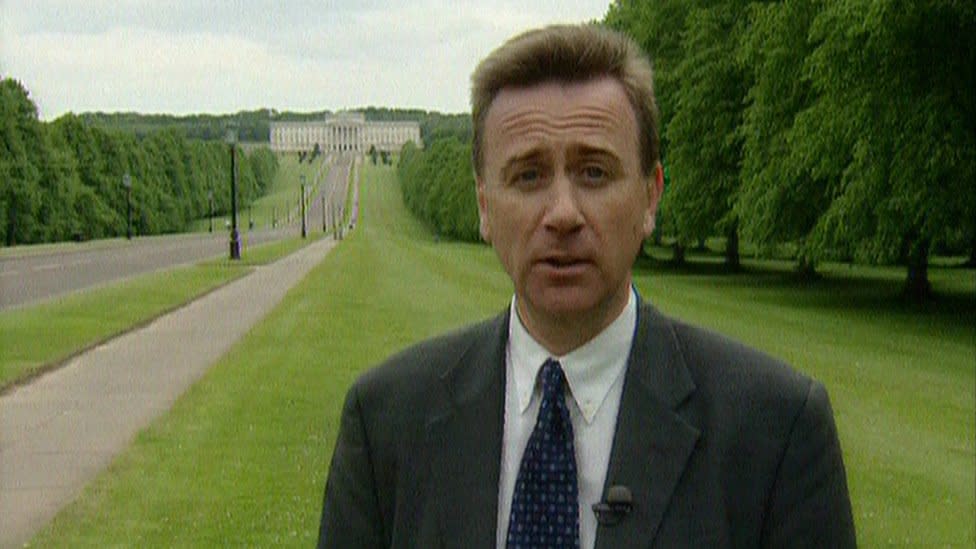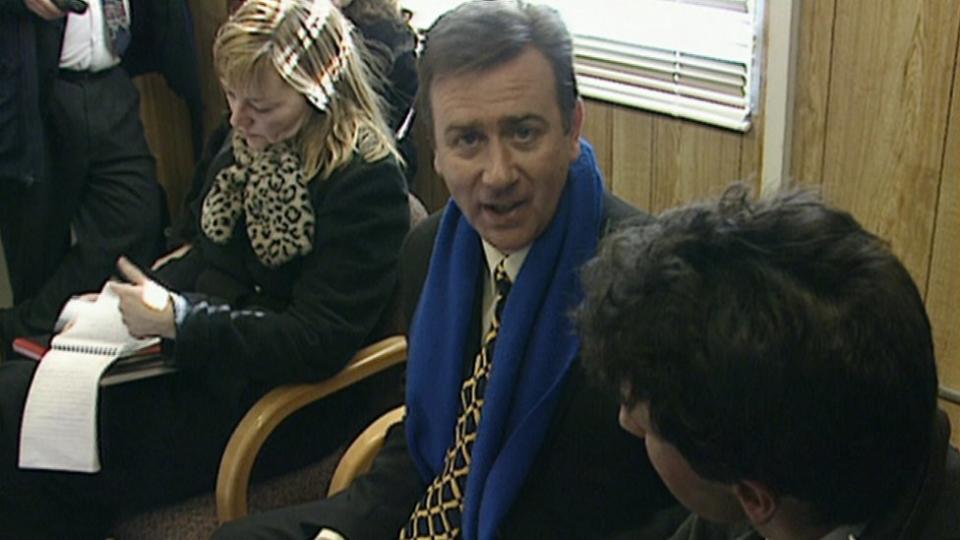Stephen Grimason: Fiercely competitive, but always a team player

The death of former BBC Northern Ireland political editor Stephen Grimason means that one of the secrets of the peace process will never be revealed.
No matter how many times he was asked, Stephen never disclosed who leaked him a copy of the Good Friday Agreement before it was published in April 1998.
"A source is for life, not just for one day," he told me, when I last asked him.
Stephen was a man of his word.
The only extra information he disclosed was that there was more than one person involved.
His leaked copy of the Agreement went around the world on that landmark Friday.
Once Stephen got the leak, he convened a quick meeting in a small Portakabin on the Stormont estate and shared the contents - but not the source - with the other BBC broadcasters at the time, including Denis Murray, Mark Devenport, Seamus McKee, Jane Dodge and Peter Hunt.
Stephen was fiercely competitive, determined to be first with the news but he was also a team player.
In 1998, I was BBC NI political correspondent working with Stephen in the political unit. In terms of political broadcasters at the BBC in Belfast, it was just the two of us.
We were close colleagues, sharing contacts, tip-offs, food and often sofas as we napped during many late nights at Stormont.
I spent more time with him in 1998 than my wife and baby daughter, Grace.
On Good Friday morning, he devised a strategy. He would take the difficult job, finding out what was happening behind-closed-doors inside the talks, while my task was simply to watch outside - for walkouts.
In the end, he got the leak and revealed all the details the agreement, I broke the news that Jeffrey Donaldson (a key member of the Ulster Unionist negotiating team at the time) had walked out.
Stephen's strategy worked.
Firm but polite
He was a stickler for proper grammar.
On the final week of the negotiations, speaking on BBC Radio Ulster, I said "there's three days to go until the deadline".
He was straight on the phone - "there ARE three days, not there is".
He enjoyed a colourful turn of phrase.
When one round of the Stormont negotiations was heading towards inevitable failure, even though the talking was continuing, he stood in front of the building and said on live TV: "The wheel is still turning here but the hamster is dead."
He defended his polite but firm style of political interviewing by saying: "There's more than one way to skin a cat."
When he sent me off to far flung places to do quick interviews for him, he used to say: "What's the point of having a dog and doing your own barking?"
Under pressure, with tight deadlines, there was nobody better.
"There's no point panicking, it just wastes time," he often said.
All the key players in the Stormont negotiations respected him, which is no mean feat in Northern Ireland's divided society, where some politicians can be thin-skinned and bear grudges.
Indeed when Stephen left the BBC in 2001, political leaders contributed to his leaving tape with video messages, including the then SDLP leader John Hume, Ulster Unionist leader David Trimble plus Sinn Féin's Gerry Adams and Martin McGuinness.
There was some surprise in media circles when Stephen left to become director of communications at the power-sharing executive, which was created by the Good Friday Agreement.
He quickly became labelled "Grim the spin".
The truth was, he knew the media pack too well to try to over-sell new initiatives, and in reality it turned out to be more of a crisis-management job than anything else.
Behind the scenes, Stephen impressed with his grasp of policy as well as public relations.
The fact that his career started during the Troubles and ended as budgetary matters came to the fore shows how much Northern Ireland has changed.
Back in the 1990s, when Stephen made his name, politics was about life and death.
Careless words could cost lives.

During those times, Stephen helped steer BBC Northern Ireland's coverage of the political process.
When the world's media arrived outside Stormont's Castle Buildings during Easter week 1998, there was silence in the press room when Stephen came on BBC Newsline at 18:30 with the latest from inside the talks.
The press pack was so large, a huge marquee had to be erected.
When the large white temporary structure appeared, Stephen smiled and remarked "every circus needs a tent."
While some journalists were sceptical about the chances of a breakthrough that week, Stephen was predicting a deal.
He was right.
'The trick is not minding'
Stephen's love of a concise turn-of-phrase stuck with him right to the end.
During a recent catch-up, he talked about being told his illness was terminal.
"The trick is not minding," he said.
All our exchanges after that were not about his health but golf, Ulster Rugby, his beloved Chelsea FC and, of course, politics
When I visited him hospital in his final days, he gave me his forecast for each of the 18 local seats in the Westminster election. He had been studying the boundary changes, in between medical treatment.
His body was weak, but his mind remained strong.
Stephen will always be remembered for that week in 1998, and how he broke the news of the deal.
"I have it in my hand," he famously said, as he waved the previously-unseen agreement at the camera on live television.
We will never know how it got there.
The trick is not minding, and instead taking time to remember one of the great journalists of our time.

